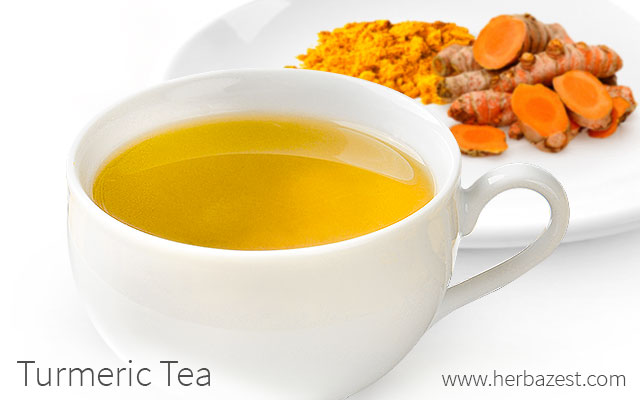With several millennia of history under its belt, turmeric has been consumed and used on many different forms. Among the most popular is turmeric tea, a simple preparation that has been around for ages. Turmeric tea is recognized in traditional folk medicine for its natural antiseptic, antibacterial, and astringent properties. The benefits of drinking turmeric tea have recently been confirmed by scientific research.
How to Prepare Turmeric Tea
The same turmeric benefits can be reaped from turmeric root tea (from fresh or dried rhizomes) or turmeric powder tea. In any case, the basic steps to follow are the same:
In a large saucepan, boil four cups of hot water.
Slowly add one tablespoon of turmeric spice or half a cup of freshly-minced turmeric. Exact measurements will vary according to individual preference, but the powdered spice has a more potent flavor and you will require less.
Reduce heat and let simmer for two to three minutes, or until well-incorporated.
Stir in lemon, honey, and other spices to taste.
Serve the resulting tea warm or slightly cooled, straining if necessary.
It is important to remember that the active ingredients found in turmeric tea are fat-soluble. Thus, one way of improving absorption is to serve turmeric tea with milk or cream. Another way to further potentiate its medicinal benefits is to flavor turmeric tea with black pepper and cayenne for a warming, therapeutic beverage with a bit of a spicy kick.
Turmeric Tea Benefits
Turmeric tea has been a prized medicinal beverage throughout much of ancient history. It is traditionally consumed as a treatment for dental issues, acne, indigestion, infertility, menstrual problems, boils, and respiratory illness.
Over the last several decades, researchers have been able to confirm many of the major perceived turmeric tea benefits. Among other pharmacological actions, turmeric tea possesses potent anti-inflammatory properties, which help to reduce pain and swelling of muscles and joints. Full of essential nutrients, it also stabilizes blood sugar and cholesterol levels for better weight management.
Thanks to its antioxidant properties, this herbal preparation also provides all the benefits of turmeric for skin treatments, helping improve complexion and tone for a smoother, more radiant appearance. This very same property is thought to have an anti-aging effect due to turmeric tea's ability to prevent the cellular damage caused by oxidative stress.
An added bonus is reaping the advantages of turmeric for liver health. Turmeric tea helps detoxify the liver, supporting healthy bile flow and the elimination of body toxins. Meanwhile, other turmeric tea benefits include relieving common cold symptoms, such as sinus congestion, coughs, and fevers - it is often used as a warm gargle to treat sore throats.
Besides an occasional gastrointestinal discomfort, turmeric tea side effects are virtually non-existent as long as the basic steps of preparation are followed and the recommended turmeric dosage is consumed.
For many adults, turmeric tea appears to be a truly beneficial treatment that is virtually free of adverse side effects. Longstanding evidence of its use - coupled with scientific proof of its efficacy - helps to explain its renewed popularity and why, to this day, so many still swear by the health benefits of turmeric tea.
Sources
- Herbal Medicine: Biomolecular and Clinical Aspects, Chapter 13: Turmeric, the golden spice
- Lemons and Lavender: The Eco Guide to Better Homekeeping, p. 46
- The Good Living Guide to Medicinal Tea
- The Way of Ayurvedic Herbs, pp. 194-195




